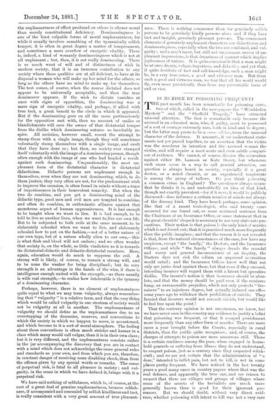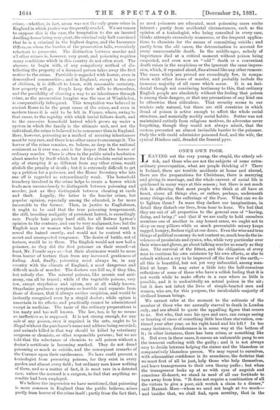IS MURDER BY POISONING FREQUENT F T HE past mouth has been
remarkable for poisoning cases, two of which, called iu the newspapers the " Wimbledon Mystery" and the Sheffield Tragedy," have attracted unusual attention. The first is remarkable only because the accused is an educated man, who, if guilty, must be possessed of a sort of courage extremely rare, both in kind and iu degree; but the latter may prove to be a cause cehbee, from the unusual character of the defence. It amounts, if we understand state- ments not yet pieced together, to an assertion that the victim was the murderer in intention and the accused woman the victim, and will require a most acute and even subtle compari- son of evidence. We cannot, of course, discuss the accusation against either Dr. Lamson or Kate Dover, but whenever such cases occur in a way to call general attention, one question is always heard in society, especially if a great doctor, or a noted chemist, or an experienced magistrate is among the group of talkers. Do you think poisoning a common crime in England ? The questioner always means that he thinks it is, and undoubtedly an idea of that kind, though not exactly prevalent—for if it were, it would be publicly discussed—does influence a certain number of minds not always of the dreamy kind. They have heard, perhaps, some opinion, like that of a recent toxicologist, who said twenty cases occurred for one found out, or some muttered sentence from the Chairman of an Insurance Office, or some statement that in the great chemists' shops it is necessary to use very elaborate pre- cautions. Their notion is that poison is the only kind of murder which is not found out; that it is practised much more frequently than the public imagines ; and that the reason it is not revealed is that, from the natural circumstances of the case, few have any suspicion, except "the family," the Doctors, and the Insurance Offices ; and while " the family " always dreads the scandal and worry and general inconvenience of an inquiry, the Doctors dare not risk the odium an unproved accusation would entail ; and the Insurance Offices know well that not only are juries dead against them, but that even if they succeed, intending insurers will regard them with a latent but operative dislike. The insurer's notion is that insurance should be abso- lute, and that the money should be paid even if the receivers hang, an unreasonable prejudice, which not only protects " fire- raisers " to an injurious degree, but actually induced one office some years ago to withdraw their prohibition of suicide. They fancied that insurers would not commit suicide, but would like to feel free upon the point !
That the contrary opinion is not uncommon, we know, but we have never seen in this country any evidence to justify a belief that poisoning was frequent, or that it escaped punishment more frequently than any other form of murder. There are more cases a year brought before the Courts, especially in rural districts, than the public quite recognises ; and, of course, the charges of attempts to poison are more numerous still. There is a certain readiness among the poor, when engaged iu house- hold quarrels or suffering from illness they do not understand, to suspect poison, just as a century since they suspected witch- craft ; and we are not certain that the administration of " a dose," intended to inflict pain, but not to kill, is not in some places pretty frequent. We have noticed in the last twenty years a good many cases in country papers where that was the real defence, and apparently the true one, and see reason to suspect that there are villages and groups of villages where some of the secrets of the herbalists are much more generally known than is good for their ignorant pos- sessors. But we should doubt, without very direct evid- ence, whether poisoning with intent to kill was not a very rare
crime,—whether, in fact, arson was not the only grave crime in England in which justice was frequently evaded. We see reason to suppose this is the case, the temptation to fire an insured dwelling-house being very great, the criminal only half convinced that he is a criminal iu the highest degree, and the Insurance Offices, on whom the burden of the prosecution falls, excessively reluctant to prosecute. The distinction between murder and all other crimes is, however, very great, and poisoning requires many conditions which in this country do not often meet. The absence, to begin with, of any compulsory method of dis- tributing the property of a deceased person takes away the first motive to the crime. Parricide is regarded with horror, even in demoralised communities ; and in England, except in the case of children, it is difficult to know, with reasonable certainty, how property will go. People keep their wills to themselves, and the possibility of cleaving a way to an inheritance through crime, as the proSecution imagine was the case at Wimbledon, is comparatively infrequent. This temptation was believed in ancient Rome to be the great cause of the crime, and even in modern times it is said to be felt in France, where, owing to that cause, to the rapidity with which burial follows death, and to the excessive household hatred which grows up under a system in which the family is the ultimate unit, and not the individual, the crime is believed to be commoner than in England. Here, however, poisoning as a method of securing inheritances must be very rare, and there is no other cause to encourage it. The horror of the crime remains, we believe, as deep in the national sentiment as it ever was, and is far deeper than' the horror of ordinary murder. There is often in the public mind a hesitation about murder by itself which, but for the absolute social neces- sity of stamping it as different from any other crime, would abolish the penalty of death ; but it is extremely difficult to get up a petition for a poisoner, and the Home Secretary who lets one off is regarded as extraordinarily weak. The household treachery involved iu the crime helps to create a horror which leads men unconsciously to distinguish between poisoning and murder, just as they distinguish between cheating at cards and theft. Legally, the latter is the heavier crime, but popular opinion, especially among the educated, is far more inexorable to the former. Then, in justice to Englishmen, it ought to be said that the true poisoning temperament, the still, brooding malignity of persistent hatred, is exceedingly rare. People hate pretty hard still, for all Buiwer Lytton's opinion to the contrary, and can be very malignant, too; but the English man or woman who hated like that would want to reveal the hatred overtly, and would not be content with a secret and unsuspected vengeance. The desire of battle, not of torture, would be in them. The English would not now boil a poisoner, as they did the first poisoner on their record—at least, Mr. Fronde says so—but their abstinence would be more from horror of torture than from any increased gentleness of feeling. And, finally, poisoning must always be, in any country with the climate of England, a most dangerous and difficult mode of murder. The doctors can kill us, if they like, .but nobody else. The mineral poisons, like arsenic and anti- inony, can all be traced ; while of the vegetable poisons, very few, except strychnine and opium, are at all widely known. Strychnine produces symptoms so horrible and separate from those of disease, that it always excites suspicion, and would be instantly recognised even by a stupid doctor; while opium is uncertain in its effects, and practically cannot be administered except in medicine. The taste Of the ordinary preparations is too nasty and too well known. The law, too, is by no means so ineffective as is supposed. It is not strong enough, for any sale of any poison, even if required in the arts, ought to be illegal without the purchaser's name and address being recorded; and animals killed in that way should be killed by veterinary
surgeons or chemists, or other responsible persons ; but we are told that the reluctance of chemists to sell poison without a doctor's certificate is becoming marked. They do not dread poisoning so much as suicide, and the consequent remarks of the Coroner upon their carelessness. No laws could prevent a toxicologist from procuring poisons, for they exist in every garden and almost every field ; but ordinary men know nothing of them, and as a matter of fact, it is most rare in a detected case, unless the accused is a surgeon, to find that anything re- condite had been employed.
We believe the impression we have mentioned, that poisoning is more common in England than the public believes, arises partly from horror of the crime itself ; partly from the fact that,
as most poisoners are educated, most poisoning cases excite interest ; partly from accidental circumstances, such as the opinion of a toxicologist, who being consulted in every case, thinks attempts excessively numerous, or the frequent applica- tions to chemists for the means of committing suicide; and partly from the old cause, the determination to account for every unaccountable death. In the middle-ages, nobody of importance died at a critical moment without poison being suspected, and even now an " odd " death or a convenient death raises in the suspicious or the ignorant the same impres- sion, which, if repeated aloud, flies abroad like any other rumour. The cases which :are proved are exceedingly few, in compa- rison with other forms of murder, and probably include the immense majority of all cases which occur. It is an inci- dental though not convincing testimony to this, that ordinary English people are absolutely without the feeling that poison is among their dangers, or that any precautions of any kind can be otherwise than ridiculous. That security seems to our readers only natural, but there are still countries in which dread of poison is active enough to affect the whole social structure, and materially modify social habits. Suttee was not maintained entirely from religious motives, its advocates never forgetting, though they would not always admit, that the custom presented an almost invincible barrier to the poisoner. Only the wife could administer poisoned food, and the wife, the cynical Hindoos said, dreaded the funeral pyre.







































 Previous page
Previous page